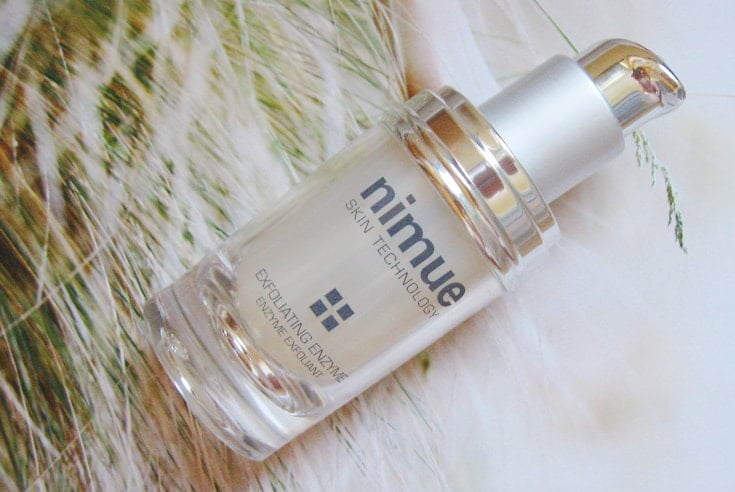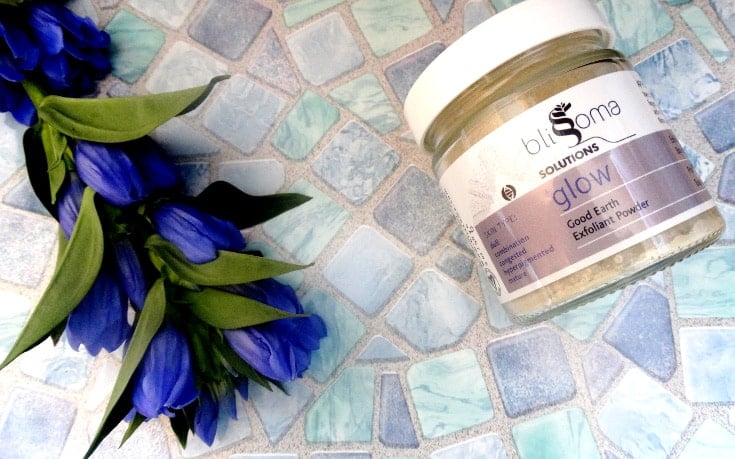When I first got into skincare, I thought scrubs were the only way to exfoliate your skin (I know, duh!).
Oh, how I loved rubbing those scrubs all over my face – seeing all those dead skin cells come off was so satisfying!
But scrubs have a dark side. When I rubbed too enthusiastically, they’d leave my skin red and raw. Ouch!
Then, in my mid-20s, I discovered glycolic acid. Glycolic acid is a chemical exfoliant, just like lactic and salicylic acids. They are a bit underwhelming at first because you can’t see the shedding happening.
But, it’s happening indeed. And when glycolic acid is done with your skin, it leaves it much smoother and brighter than any scrub can ever do. Plus, it also hydrates skin and boosts the production of collagen. Show me a scrub that can do that. They don’t exist. Needless to say, I excitedly made the switch and never looked back.
But now there’s a new exfoliating kid on the block. It’s called enzyme exfoliant and uses enzymes derived from foods, such as pineapple and papaya, to get rid of your dead and dull skin cells.
So, what’s the deal with them? Are enzyme exfoliants better than chemical exfoliants or shouldn’t we bother with them?
What’s An Exfoliant?
An exfoliant is something that gets rid of dead skin cells.
Scrubs work like sandpaper, buffing away those cells manually at the surface.
Chemical exfoliants dissolve the “glue” that hold skin cells together, so they can slough off.
Enzyme exfoliants are similar to chemical exfoliants, but not quite. They do some things differently (and not always in a good way).
Related: How To Choose The Best Exfoliator For Your Skin Type
Struggling to put together a skincare routine that minimises wrinkles, prevents premature aging, and gives your complexion a youthful glow? Download your FREE “Best Anti-Aging Skincare Routine” to get started (it features product recommendations + right application order):
What Are Enzymes?
Enzymes are chemicals that speed up the rate of chemical reactions by lowering their activation energy.
For example, enzymes allow reactions that would literally take millions of years to occur in just a few milliseconds!
Or reactions that would normally require dangerously high-temperatures occur at normal body temperatures when enzymes are around to do their job.
Aren’t they super cool? There’s no way we could be alive without them.
How Do Enzyme Exfoliants Work?
Ok, so enzymes can do some really cool stuff. But, what do they do in an exfoliant?
Exfoliants contain proteolytic enzymes. That’s a fancy way of saying they’re “able to breakdown proteins”.
And guess what keeps those dull and rough outer layers of your skin stuck on your face? Keratin protein.

What Are The Most Common Enzymes Used In Enzyme Exfoliants?
There are three enzymes that you’ll likely see pop up again and again in this kind of exfoliant:
- Bromelain: It’s extracted from pineapple. On the label, it often hides under the name Ananas Cosmosus (Pineapple) Fruit Extract.
- Papain: You guessed it, haven’t you? Yep, it’s derived from papaya. You’ll find it as Carica Papaya Fruit Extract on the label.
- Pumpkin enzyme: Ok, this is easy. It comes from pumpkin and disguises itself as Cucurbita Pepo (Pumpkin) Enzyme.
Related: The Complete Guide To Bromelain In Skincare
Why Should You Use An Enzyme Exfoliant?
Enzymes are much gentler than scrubs. Not that it takes much to be gentler than a scrub, mind you.
But most enzymes also have anti-inflammatory properties that soothe irritations, so they’re great for sensitive skin.

Do Enzyme Exfoliants Have Any Side Effects?
Sounds too good to be true? Well, there IS a catch.
Enzymes are divas. If the temperature and pH of a product ain’t just right, they won’t work. Any changes in their environment make them become unstable and useless.
It’s very tricky for cosmetic chemists to work with enzymes. Coming up with a formula that makes them happy can take a lot of time. I guess that’s why there aren’t that many enzyme exfoliants out there yet.
By the way, even if the chemists get everything right, there are still plenty of occasions for the enzymes to becomes unstable.
For example, if these exfoliants stay for weeks on shop shelves that are in front of direct sunlight or if you keep them in the hottest room in your house, chances are they’ll go bad.
Enzyme exfoliants need to be stored in a cool and dark place. Period.
Oh, one last thing. Enzyme exfoliants can irritate sensitive skin.
Wait, what? Didn’t you just say that enzymes have anti-inflammatory properties, Gio?
Yep. But it’s sensitive skin we’re talking about here. Some folks with sensitive skin can tolerate time-released retinol, for example. For others, even that is too much.
Enzyme exfoliants may be gentler than scrubs, but if you have sensitive skin, you never know if they’ll bother your skin until you try them.
They can be your best friends or your worst enemy. Pretty much like anything else you try to put on your skin. *sighs*
Related: 9 Soothing Tips To Care For Sensitive Skin
The Bottom Line
Enzymes exfoliants are cool, but too unstable yet. They go bad easily and there is no way of knowing when that will happen. That brand new bottle in the store may already be useless. Until science finds a better way to make enzyme exfoliants stable, I’ll stick to glycolic acid.


Ya. I certainly have to agree with you on the scrubs. I got a sample of a sea salt scrub from Lush and heck it was harsh. Gave me a few red bumps even though I was trying to be very gentle!
Are there enzyme serums? Are enzymes less “heavy duty” than glycolic acid?
Hannah, oh no! Scrubs are best left on the shelves, aren’t they?
Yes, they’re less heavy duty. But they are also more unstable. Also, glycolic acid has anti-aging properties as it can boost the production of collagen. It hydrates skin too. So, it still remains my top choice.
I think some serums contain enzymes, but, as I said, they’re not reliable ingredients. They’re too unstable yet.
Just tried my first enzyme exfoliante yesterday! We had used glycolic acid previously and it literally felt like my face was on fire. So me esthetician did some reserach and changed to enzymes. MUCH better. Still left my face a little red and sensitive, but I think it was due to some other things that I was using plus a scrub the night before… It´s interesting though, because the enzyme we used she said comes from SHEEP (sheep´s stomach to be exact). Any opinions on that?
Barbara, do you know the name of enzymes? I’m not aware of any derived from sheep in skincare but I can do some research.
I was talking to a dermatologist lately who said he doesn’t like glycolic acid because it’s quite harsh. I like it myself but it’s one of those things that are best used sparingly. Still, it’s great there are so many alternatives these days. And stop using scrubs! Those are even harsher than glycolic acid!
Even rice scrubs (asks sheepishly). It´s from Origins.
I´ll ask about the name of the enzyme the next time. I couldn´t find much on sheep stomach enzyme either, HAHAHAHA omg… just the thought o_o
I’ve been doing some more research, but I couldn’t find anything. This one is pretty mysterious… and a big gross. lol 🙂
So for us sensitive-skinned gals we are left wioth only lactic acid, eh?
What about body exfoliants though? I use whatever I use on my face & neck on the back of my hands also, to avoid that young face-old hands look when i’m older. But will lactic acid be good enough to exfoliate body skin since it’s sooo gentle?
Audrey, I only recommend lactic acid and washcloths for sensitive skin, both on skin and body. I guess that, if your body is more resilient and not as sensitive, you could use it twice rather than once a week. But always proceed with caution. Exfoliation isn’t something you want to overdo even if you don’t have sensitive skin.
I’ll definitely keep that in mind when I’m brave enough to try exfoliants. My atopic eczema and rosacea definitely made me terrified at the sound of any exfoliant.
You’re still very young, Audrey. You can put it off a bit longer until your skin needs it. 🙂
I’ve been trying to deal with closed comedones for over a year now.
I currently use lotion p50 pigm 400 from biólogoque recherche, which has been very effective and doesn’t irritate.
These Whitehead’s are super stubborn. Recently I incorporated benzoyl peroxide on alternative nights.
Any recommendations on how to treat these bad things? I don’t want to always do extractions since they come back frequently.
Ero, don’t use benzoyl peroxide. That’s for inflamed acne and pimples, not whiteheads. The only thing that works against whiteheads is salicylic acid, which is in BR lotion. If that doesn’t work, it either means that you need a higher dose of salicylic acid or that the clogs are so hold, you need manual extractions. But in the second case, regular use of BR lotion should keep them from coming back. If that’s not the case, you may just need a higher dose of SA.
I used a fruit enzyme exfoliant that I got from European Wax Center. They have their own skin care line. It was love at first use. I could feel and see the dead skin coming off and it was only $22. My face was softer and smoother after each use. Unfortunately, EWC decided to fix something that wasn’t broken. They discontinued the product and replaced it with what was supposed to be a similar and better exfoliating mask product. The new product is terrible and the exfoliation is really just the product clumping together. It made no difference in my skin texture. I’ve been in search of a fruit enzyme exfoliant ever since. I use Differin so I don’t think I can use glycolic or salicylic exfoliants.
Deidre, oh no! I hate it when that happens! Why fix something if it ain’t broken?
Have you tried lactic acid? It’s the gentlest of the acids so you should be able to use it once a week with Differin.
Hi there. I am really struggling with a oily t-panel. I have done for some time and its getting worse. Need some help please. Also struggle with mild acne. Tried all sorts! Been researching and bought some Salicylic Acid to use. I also want to get a good exfoliator and mask. Are any of these any good: Nourish Kale Enzymatic exfoliator or Andalou Naturals Exfoliating Mask, Kombucha Enzyme? Thank you
Hi Clarice, a salicylic acid is a good exfoliator. So if you already have that, you don’t need another exfoliator. You can check out this post for my tips on how to deal with oily skin, including the best masks to try: https://www.beautifulwithbrains.com/how-to-care-for-oily-skin/
I read that exfoliating property of Bromelain in Ananas Cosmosus (Pineapple) Fruit Extract is only active for about 15 mins after it’s diluted in water, so I think buying commercial exfoliants with Bromelain that contain water is pointless. I bought this extract in a DIY shop and wonder how often can I use it on acne prone skin? I feel like 1x/week is not enough.
Also, great blog! I’ll definitely keep coming back to it very often 🙂
Cheers from Poland,
Andrzej
Andrzey, enzymes are very unstable. If you want to be sure your exfoliant works, go with an acid like glycolic or salicylic.
Should you use enzymes for visible pores?
Anna, no. You need salicylic acid for that.